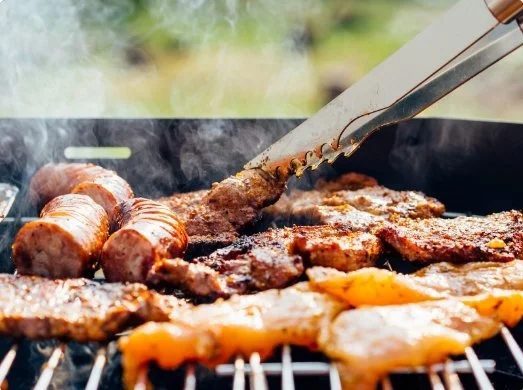How to Reduce Grilling Carcinogens
Simple Steps for Healthier BBQ
Introduction
Grilling is a beloved cooking method that brings out delicious flavors in our favorite foods. However, it's essential to be aware of the potential health risks associated with grilling, particularly the formation of carcinogens. The good news is that you can significantly reduce grilling carcinogens by as much as 99% with some simple techniques and precautions. This blog post will explore making your grilling experience healthier without sacrificing taste.
Understanding Grilling Carcinogens
Before we dive into the solutions, it's crucial to understand what grilling carcinogens are and how they form. When meats are cooked at high temperatures, especially over open flames, two main carcinogens can develop:
Heterocyclic Amines (HCAs): These form when amino acids, sugars, and creatine in meat react at high temperatures.
Polycyclic Aromatic Hydrocarbons (PAHs): These are created when fat and juices from meat drip onto the fire, causing flames and smoke that adhere to the food.
Both HCAs and PAHs have been linked to various types of cancer in studies. However, you can significantly reduce their formation during grilling by implementing specific strategies.
Effective Techniques to Reduce Carcinogens
Here are some proven methods to reduce grilling carcinogens by as much as 99%:
Marinate Your Meat: Marinating meat before grilling can reduce HCA formation by up to 99%. Use marinades containing herbs, spices, and acidic ingredients like vinegar or lemon juice.
Precook Larger Cuts: Partially cooking more significant cuts of meat in the oven before finishing them on the grill can significantly reduce exposure to high heat.
Flip Frequently: Turning meat frequently while grilling can help prevent charring and reduce HCA formation.
Trim Fat: Trimming visible fat from meat before grilling can reduce flare-ups and PAH formation.
Use Lower Heat: Grilling at lower temperatures can help reduce the formation of HCAs and PAHs. Aim for medium heat rather than high.
Avoid Charring: Remove any charred portions of meat before eating, as these contain the highest concentrations of carcinogens.
Grill Vegetables and Fruits: Plant-based foods don't form HCAs when grilled, making them a healthier alternative to meat.
Healthier Grilling Marinades
Marinating your meat is one of the most effective ways to reduce carcinogen formation. Here are some healthy marinade ideas:
1. Herb and Citrus Marinade:
1/4 cup olive oil
Juice of 2 lemons
2 tablespoons fresh herbs (rosemary, thyme, oregano)
2 cloves garlic, minced
Salt and pepper to taste
2. Antioxidant-Rich Marinade:
1/4 cup red wine vinegar
2 tablespoons olive oil
1 tablespoon Dijon mustard
1 teaspoon honey
1 clove garlic, minced
1 teaspoon dried oregano
3. Asian-Inspired Marinade:
1/4 cup gluten free soy sauce (low-sodium)
2 tablespoons rice vinegar
1 tablespoon sesame oil
1 tablespoon grated ginger
1 clove garlic, minced
1 teaspoon honey
Marinate your meat for at least 30 minutes, but no longer than 24 hours, to maximize flavor and minimize carcinogen formation.
Best Practices for Safer Grilling
In addition to the techniques mentioned earlier, here are some best practices to ensure safer grilling:
Clean Your Grill: Regularly clean your grill to remove any built-up char or residue contributing to carcinogen formation.
Use a Meat Thermometer to ensure the meat is cooked to a safe internal temperature without overcooking. Check the USDA's recommended temperatures for different types of meat.
Create a Barrier: Use aluminum foil or cedar planks to create a barrier between the meat and the flames, reducing direct exposure to high heat.
Incorporate Antioxidants: Include antioxidant-rich foods in your grilling menu, such as colorful vegetables and fruits, which can help counteract the effects of carcinogens.
Limit Grilling Frequency: While grilling can be a healthy cooking method, it's best to vary your cooking techniques and not rely solely on grilling for every meal.
Choosing the Right Grilling Equipment
The type of grill and accessories you use can also impact carcinogen formation:
Gas vs. Charcoal: Gas grills generally produce fewer PAHs than charcoal grills, allowing for better temperature control.
Grill Mats: Using a non-stick grill mat can help prevent food from entering into direct contact with flames while allowing for desirable grill marks.
Vertical Grilling: Consider using a vertical grill or rotisserie attachment, which allows fat to drip away from the heat source, reducing flare-ups and PAH formation.
Smoker Boxes: If you enjoy that smoky flavor, use a smoker box with wood chips instead of exposing food directly to smoke, which can contain PAHs.
Infrared Grills: These grills heat food directly rather than heating the air around it, potentially reducing the formation of HCAs.
Remember, no piece of equipment is perfect; the most important factor is how you use your grill and prepare your food.
Conclusion
Grilling can be a healthy and enjoyable way to cook food when done with care. By implementing these strategies to reduce grilling carcinogens by as much as 99%, you can continue to enjoy delicious grilled meals while minimizing potential health risks. Remember to marinate your meats, avoid charring, use lower heat, and incorporate plenty of vegetables and fruits into your grilling routine. These simple steps make your next BBQ tasty and healthier for you and your loved ones.

